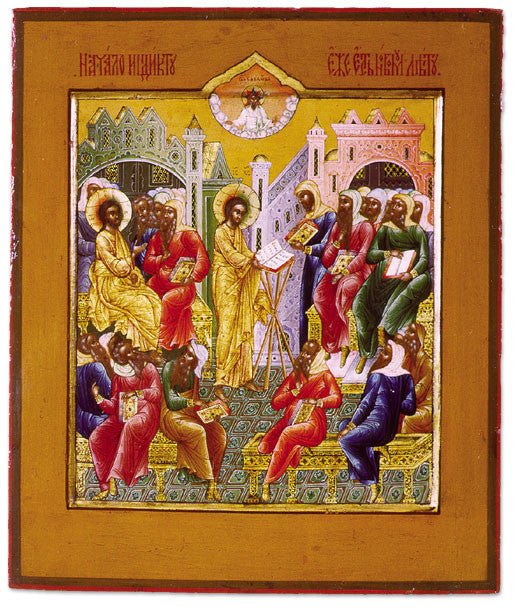Sermon for the Indiction (2014)

+ In the Name of the Father, and of the Son, and of the Holy Spirit. Amen.
Today the Church celebrates the feast of the Indiction, which is the first day of the new church year. It is an ancient tradition to mark the beginning of the New Year on September 1st. This practice was observed in the Byzantine Empire until the fall of Constantinople in 1453, and in Russia until the reign of Peter the 1st.
The word “indiction” means “a proclamation,” and its origins can be found in the Roman Empire. September 1st in the Roman Empire marked the beginning of the fiscal year, and the Emperor would make a proclamation on that day with the aim of facilitating tax collections.
Yet even earlier than this, the beginning of September was seen as the beginning of a New Year for the Hebrew tribes. It was a time when harvests for the year were collected and stored, and trumpets were sounded and prayers given in thanksgiving to God for the past year’s harvest, and God was beseeched to bless the winter months ahead. So, the Hebrew civil year, as we read in Exodus, begins in September.
But there is a deeper spiritual meaning to the feast of the Indiction. On this feast, the Church, through the hymns, the prayers, and the Scripture readings of today, draws us to reflect on how we, as Orthodox Christians, view time in relation to our spiritual life and our salvation.
Before the coming of Christ, most of humanity saw time as something cyclical. Certainly the Greeks saw the world this way. The seasons change in a round of cycles, people are born, grow old, and pass away. The sun rises and sets. And all of this in perpetuity, with no necessary beginning and no necessary end. It was not generally thought that history had an end – that it was going somewhere. Yet with the coming of Christ and the spread of Christianity, the world began to see things differently. Indeed, time does have a beginning, and history certainly does have an end. And not only does history have an end, but it has a purpose as well! A purpose, as well as a meaning.
As Christians, we know that all will end in the Last Judgment and the Resurrection. Jesus will return, the dead will be raised, and we will enter into a new existence. We will enter into eternity. This is the End.
And in the Gospel reading today, we have a beginning. In the Gospel of Luke, we hear of how Christ came to Nazareth. He went into the synagogue on the Sabbath day, and stood up to read. When He was handed the book of the prophet Isaiah, He did not open it randomly, but He found a specific passage and He read:
The Spirit of the Lord is upon Me, because He has anointed Me to preach the Gospel to the poor; He has sent Me to heal the brokenhearted, to proclaim liberty to the captives. And recovery of sight to the blind, To set at liberty those who are oppressed; To proclaim the acceptable year of the Lord.(Luke 4:16-19)
And He said to those present:
Today this Scripture is fulfilled in your hearing. (Luke 4:21)
It is the Church tradition that this event took place on September 1st, and so it was on this date that Christ began to proclaim the good news of His mission on this earth. And Jesus tells His listeners that this prophecy has been fulfilled, and history is moving towards its End. In the fullness of time, God sent His Son into the world to proclaim the Good News, saying: “Today this scripture has been fulfilled in your hearing.”
And so God sent His Son in time to redeem the time, and to bring us to salvation. And so time matters, and has been given to us for our salvation – to make use of it in order that we might draw closer to God. It is for this reason why we have times and seasons for feasts and fasts, so that we may redeem the time and participate in “this acceptable year of the Lord.” And each moment, and each minute, is important and not to be wasted. This moment has meaning because time has meaning. This moment has purpose because time has purpose. Will I use this moment to draw closer to God, and thus draw closer to eternal life in Christ? Or will I choose earthly life? A life that ultimately leads to death and decay in the passions and darkness of my own self-centeredness? And when our time is up, will I find myself at the wedding banquet in the Kingdom? Or will I find myself in the outer darkness due to my own negligence – of my own choosing.
It seems that we, in the modern 21st century, have more and more of everything, yet we complain that we have less and less of one thing – time. However, do we really use our time wisely? Do we “redeem the time,” sanctifying it and offering it to the Lord in thanksgiving and gratitude? Or do we squander and waste it in any myriad of distractions, mindless entertainments and frivolities? Is our time eaten away by cares of this world, with no thought of Eternity and our immortal souls. Let us not waste time, and today, let us make a good beginning. Let us take to heart the words of the great luminary of North America, St. Herman of Alaska, who exhorts us saying: “For our good, for our happiness, at least let us give a vow to ourselves, that from this day, from this hour, from this minute we shall strive above all else to love God and to fulfill His Holy Will.” Amen.


Leave a comment